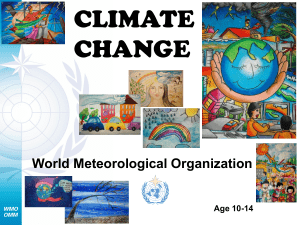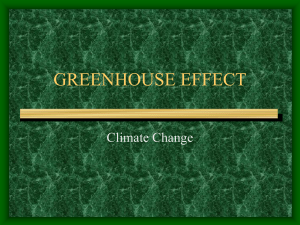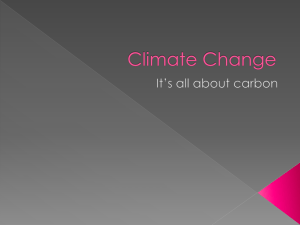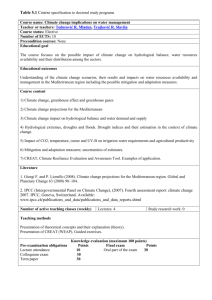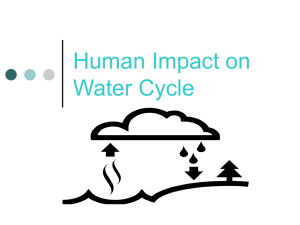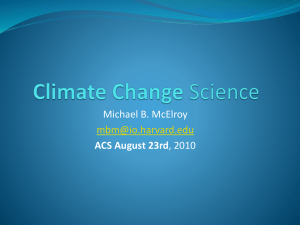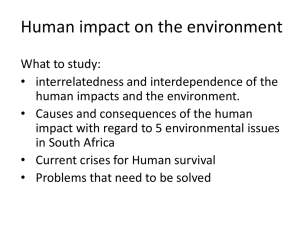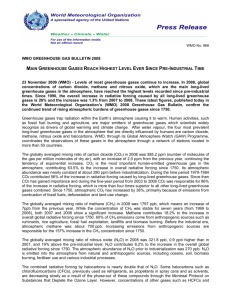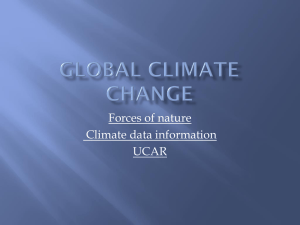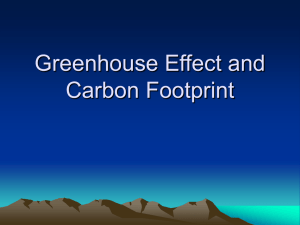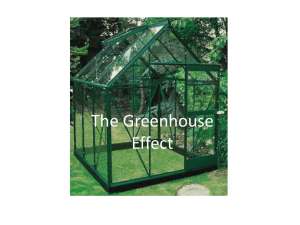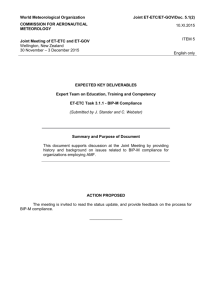Main Natural Factors that Affect Climate
advertisement
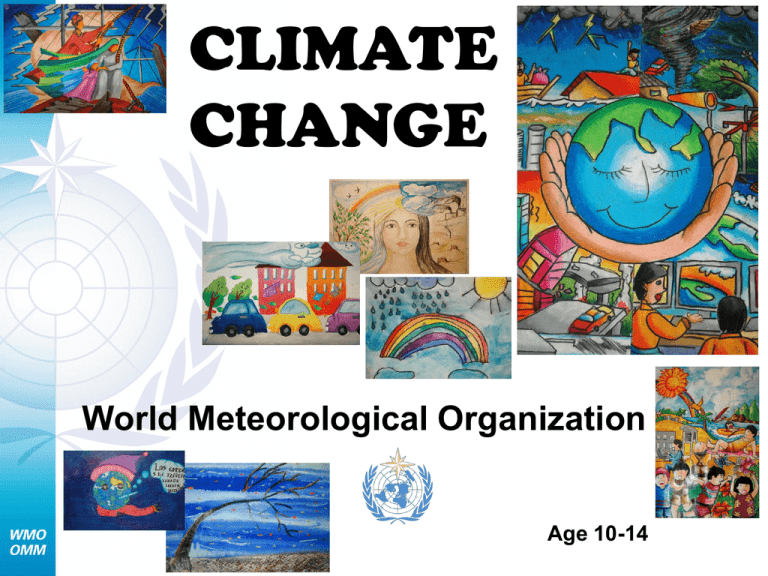
CLIMATE CHANGE World Meteorological Organization Age 10-14 Introduction Have you noticed that today, everyone speaks about climate change? Learn from this presentation and be the one who knows best! Before explaining what climate change is, do you know the difference between weather and climate? The Weather Weather describes whatever is happening outdoors in a given place at a given time. It is measured through wind, temperature, humidity, atmospheric pressure, cloudiness, and precipitation. What is the weather like today? Do you know an activity that is not directly or indirectly influenced by weather? Did you know that the coldest temperature ever recorded was -89.2°C (-128.5°F) at Vostok, Antarctica (3420m high) on 1983 The Climate Climate is the average of weather over time. Climate tells us what weather is usually like in a given place. How would you describe the climate where you live? What is climate variability ? “Climate variability” refers to changes in climate from one year to another. It can be caused by changes in ocean conditions far away, which can affect climate all over the world (for ex: el Niño) Climate variability is natural and occurs on a regular basis. What is climate change ? Climate change is the change in climate over a time period from 10 to 100s of years. Climate change involves both natural changes and changes caused by people. Why does our climate change? • Over the history of the Planet, the climate has changed naturally. It happened during the ice ages, and maybe also when the dinosaurs disappeared. • In addition, human activities have warmed the climate. Main Natural Factors that Affect Climate Main Natural Factors The Sun • The amount of energy coming off the Sun is not constant but keeps changing • Slow changes in the Earth's distance from the Sun affect the amount of energy received from the Sun. • Those variations are believed to be one of the causes that start ice ages. Main Natural Factors • Volcanoes - when a volcano erupts it throws out large amounts of sulphur dioxide (SO2), water vapour, dust, and ash into the atmosphere. • The climate system is made up of many components that all affect climate: this includes ocean currents, atmospheric circulation, sea ice and land covers (trees, grass…) Main Natural Factors The Greenhouse Effect controls our climate • When energy from the Sun enters the Earth's atmosphere, about a third of it is reflected back to space. • Of the remainder, most is absorbed by the Earth’s surface. Some also stays in the atmosphere, absorbed by water vapor and green house gases. • This natural Greenhouse Effect is vital to life as we know it. • Right now, the average temperature on the Earth is 15°C. If there was no greenhouse effect, the average temperature would be -18°C (33°C colder than it is now – too cold for most living beings). 3 is the Greenhouse Effect Main Human Factors that Affect Climate Main Human Factors Greenhouse Gases • Human activities send gases (for example methane, carbon dioxine CO2) into the athmosphere that enhance the greenhouse effect. • Many of the gases come from fossil fuels such as oil, coal and natural gas to run vehicles, and generate electricity for industries or households. • When the atmosphere contains too much of those gases, the whole atmosphere and the Earth becomes hotter, like it does in a greenhouse. The atmosphere holds on to too much heat, instead of letting it escape into space. This causes global warming ! Main Human Factors The example of CO2 • Today there is about 25% more Carbon dioxide (CO 2) in the atmosphere than in 1860. CO2 is the greenhouse gas that people make the most of. The more CO 2 we put into the air, the more the temperature could rise. • Two of the biggest sources of CO2 are burning fossil fuels and cutting down and burning trees. • Forests are called « carbon sinks » because they take CO2 from the air and store it. When trees are cut down and burned, the CO2 that is stored in them is released back into the air. Scientists believe that every year, 2 to 5 billion tonnes of CO2 are released into the air from forests being cut down and burned. Main Human Factors Aerosols • Aerosols are tiny solid particles or liquid droplets that remain suspended in the atmosphere for a long time. •They originate naturally (for example from volcanoes) but also as a result of human activities (industries…). In the later case, aerosols are considered pollutants, which cause direct effects on the Earth’s radiation budget and also indirectly through changing the formation and behavior of clouds. Main Human Factors Land Use Change • There are over 6 billion people on Earth. Humans continue replacing forests and natural vegetation with agricultural lands. More and more people move into cities, therefore more houses are built. All this has an impact on climate. • For example, it affects the evaporation of water and therefore the rain cycle. What is global warming? It refers to an average increase in the Earth's temperature, which in turn causes changes in climate. A warmer Earth leads to a wide range of impacts on plants, wildlife, and humans. Observed data indicate that global temperature over land and ocean has increased by approximately 0.6°C (1.08°F) since the late nineteenth century. Do you know exemples of effects global warming has on our Planet? Our future climate according to scientists According to meteorologists and climatologists (they are the scientists who study weather and climate), the changing climate very likely entail more: •Heat waves •Heavy rain and snow •Droughts •Tropical cyclones Our future climate according to scientists Rising sea level Scientists also predict that global warming will cause the level of water in the oceans to rise between 15 and 95 cm in the next 100 years, because warmer temperature will cause sea ice and glaciers to melt, adding more water to oceans, and because as water gets warmer, it takes up more space Climate change affects regions differently Recently, the degrees Celsius increased or decreased compared to the average temperature recorded between 1951 and 1980. Regions in red are the most affected by an increase in temperature. The small regions in blue are affected by a cooling effect. IPCC It won IPCC stands for the Intergovernmental the nobel Panel on Climate Change created by the prize! World Meteorological Organisation (WMO) and the United Nations Environment Programme (UNEP). It brings together scientists from around the world to report on climate change. IPCC advises that for a better future, we need: • to reduce greenhouse gas emissions • to adapt to climate change (for example with better alert systems, water and food management). Through WMO, 188 Member countries worldwide produce, share and improve information on weather, water and climate, including forecasts and warnings. WMO organizes training for weather and climate professionals to bring you reliable and clear information. The Meteorological and Hydrological Services work together within WMO to improve the quality and safety of your life. National Meteorological and Hydrological Services The data that are needed to deal with the impacts of climate change are collected by the National Meteorological and Hydrological Services of all countries, including your’s. What can we do to improve our climate? Please tell us what you think For more information • WMO comic book: « We care for our planet » - WMO-No. 975 •The World Meteorological Organization in your daily life • A career in meteorology WMO-No. 1012 • WMO « Skies and Oceans » Youthfull perspectives • WMO web site : www.wmo.int • IPCC web site : www.ipcc.ch
